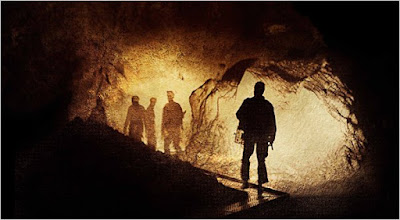Where to begin with
Tinker Tailor Soldier Spy?

Gary Oldman. Who doesn't love Gary Oldman? Is there a film where his presence doesn't own everything?! Such a great actor, he can play Dracula, Beethoven or George Smiley and be each one of those and at the same time still be Gary Oldman. In this film he plays someone older than he is... and manages to get away with the ageing make-up (I think this is tricky for most actors). He carries the drama on his shoulder mostly because his character isn't just looking for a mole, he is also human and has weaknesses of his own.
(I don't believe in spoilers, but if anyone who does is reading this, perhaps skipping the following paragraph is a good idea)
Colin Firth. I have said this before, but he's too strong of a presence in any film to just play a supporting role. So from the moment he appears, I knew who he was and what was going to happen. He plays it well though... I think we get distracted until at a certain point we say "Aha! I knew it!". He's an actor who doesn't over do it, he's always in control of his character and all of himself.
/ end of "spoilers"
The Screenplay. How do you judge a good adaptation of a book? By not even noticing it was originally a book, especially if it is a famous book (and it had been done for television too).
Tinker Tailor... doesn't really need any other explanation... nor gets into obsessive details the book reader will be waiting to find there. You just understand the rules of the world from the beginning and follow the story, because you engage with these characters who all have a story behind them. It's a thriller all along and it works wonderfully: well paced, the information is well administered.... unlike other adaptations like
The Girl With The Dragon Tattoo.
The visuals. The cinematography and art design are amazing. The camera is used to see through things, it's a spy story after all. It's a clever trick and it looks great too. The seventies are always classically stylish and the films looks just like that, everything is shiny and elegant (I've yet to see a dirty car from the seventies... dust just didn't exist back then). The only problem is the lovely Tom Hardy's hair. Something there didn't quite work, unlike Gary Oldman's ageing effect.
The music. I like the idea that Alberto Iglesias has an international
career. He's done extensive work in Spanish cinema (mainly writing for
Almodóvar) and I think he deserves to compose for all sorts of films. I
like the work he did for
Tinker Tailor... it's subtle, it goes
well with the drama. At times, it's a bit too much music, but that's
because I would have liked to listen to more of those lovely sounds.
The Sound. It is so good it made me want to cry. Little details, lots of clear crisp sounds that just set you in the drama and together with the characters. It's such a good film visually that I'm glad they made the effort to also take that level of work to the sound, it makes it a much better film.
Something strange. The lack of women characters. There's the Russian wife who suffers so she has an affair with a British spy. There's the cheating spy's wife (whose face we don't really see!). There's this lady who used to know too much but now is retired... So yes, it's mainly a boys film, perhaps the world of spies was all about boys? Anyway, it is still a good film.
Tinker Tailor Soldier Spy
 How can a film last nearly three hours (it was originally done as episodes for television) and still keep you there watching, even when the main character is suffering terrible things? Jane Campion is a great storyteller, she treats her characters tenderly and makes you feel that compassion and love for them too. She makes it look simple too, easy.... when it really isn't!
How can a film last nearly three hours (it was originally done as episodes for television) and still keep you there watching, even when the main character is suffering terrible things? Jane Campion is a great storyteller, she treats her characters tenderly and makes you feel that compassion and love for them too. She makes it look simple too, easy.... when it really isn't!











































